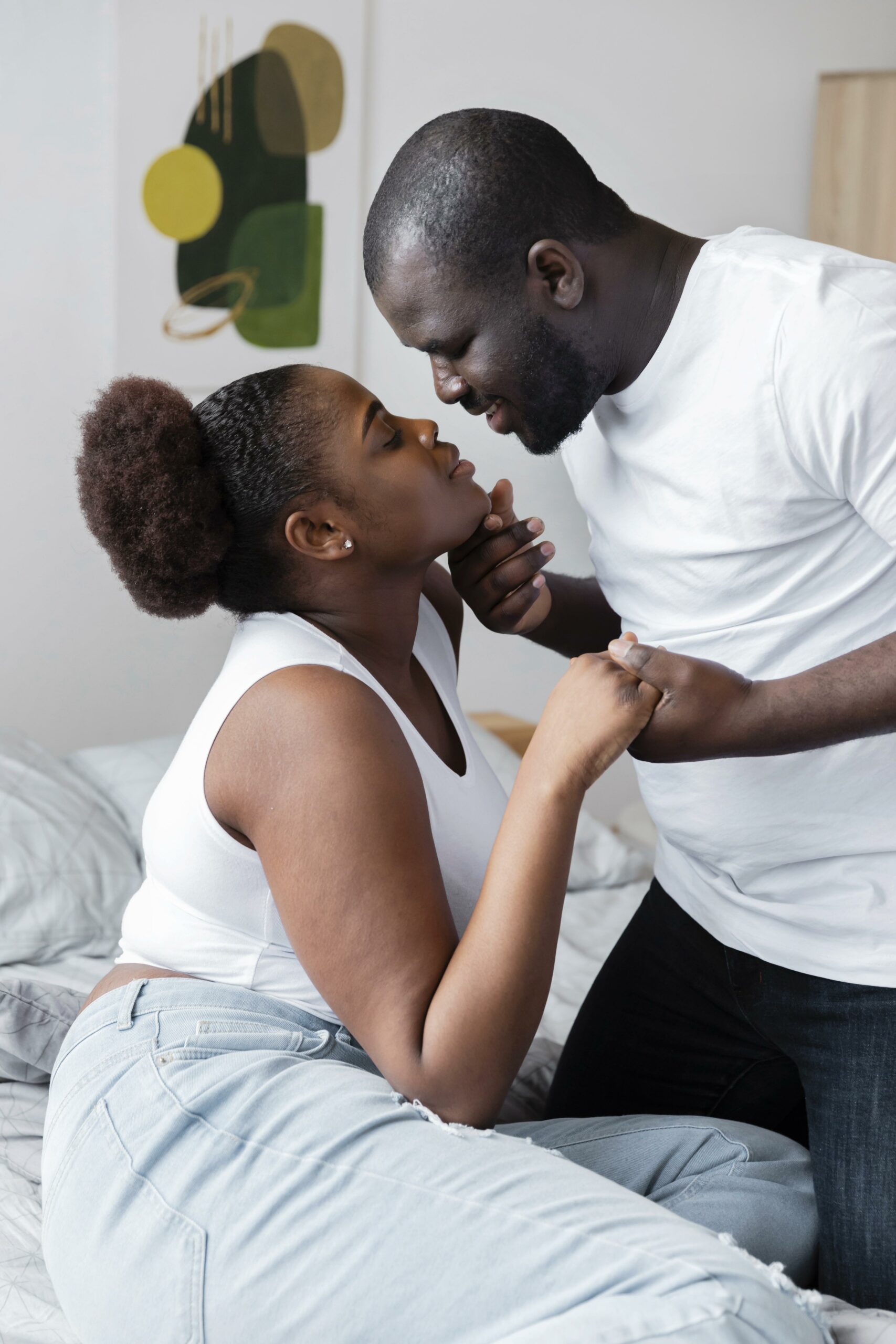
couple under covers
Courtesy of freepik.com

Courtesy of freepik.com
If you’ve ever heard someone say their sex life is subpar, chances are a lack of foreplay is on their list of complaints. This gripe is so common that most of us treat it as fact — consistently skipping foreplay leads to consistently disappointing sex.
What we rarely talk about, however, is what comes after sex, and it’s arguably even more critical than foreplay. The way we behave post-intercourse affects our sexual health, how we feel, how we value ourselves, and how we view sex.
What is Sexual Aftercare?
Just as foreplay deals with the way we treat each other before sex, aftercare is about how we treat each other when sex is over. It encompasses a wide range of activities that involve your body and mind.
Hygiene and Self-Care
You’ve heard it before, and you’ll hear it again: pee after sex! This is the easiest and most common example of postcoital hygienic self-care. Peeing after sex can help prevent infections or irritation in your genitals.
Related Articles:
How to Delicately Tell Your Spouse the Sex Isn’t Good Anymore
The Black Love Guide to Love, Sex and Intimacy
How a Regular Sex Life Could Improve Your Mental Health
Do you or your partner take any medications? Setting the alarm or reminding each other to take them after sex, if needed, is aftercare. Anything that promotes your overall health and comfort is usually a good idea, such as a glass of water or a hot shower.
A hot cup of tea or a greasy order of takeout can help your bodied replenish nutrients. If you’re the kind of person who’s very active during sex, you may want to soothe your muscles by stretching, trading massages with your partner, or simply cuddling together for a while.
You might be noticing a theme here; aftercare is about you and your partner taking care of each other. It doesn’t matter if it’s casual sex, a new relationship, or your spouse of many years; your experience will always be more positive when you express intimacy and care, even if you don’t plan on staying together.

Courtesy of freepik.com
Intimacy and Emotional Well-Being
The human mind is an enigma, so it’s never easy to tell what your partner – or even yourself – needs after sex. Some of us naturally want distance, while others want to be closer. Some need the validation of physical touch and conversation, while others feel overwhelmed by intimacy and just need to spend ten minutes alone on their phone.
As long as it doesn’t hurt your partner, there’s no wrong answer; that’s why communication is so important. If you’ve been with your partner a while, they might already know what you need after sex and be ready to provide. If they’re a newer partner, you may need to learn what they need while expressing what you need.
So tell them and ask them what. It’s okay to say that you want to cuddle or that you need space. It’s okay to balance your needs with theirs. At some point, most of us will experience Post-Coital Dysphoria (PCD), which hits us with a tide of sadness, irritability, or even tears after sex. If this happens, it’s okay! Let your partner know what’s going on and that it’s not their fault. If they’re experiencing PCD, let them know it’s okay and ask what they need.
Most of all, though, be cognizant and considerate of both your emotions. Treat each other as attentively and kindly as you did before sex.
Why Aftercare Matters
Whether we like it or not, sex is an experience that triggers some kind of emotion and connection in most of us. Even the partners who run for the door when it’s over aren’t necessarily feeling nothing; rather, they’re cautious about what they might feel.
That’s okay, and to each their own, but sex is inherently intimate. When we treat each other with care and consideration after sex, we build on that intimacy. In a relationship, this brings two people closer together and positively associates sex with feelings of nurture and love.

Courtesy of rawpixel.com
Even after casual sex, good aftercare reaffirms both partners’ inherent value as people. In simpler terms, it reminds us that we deserve to be treated well even when no one wants something from us. This not only boosts our self-esteem but it reinforces positive behaviors that make us better lovers and better people.
On the other hand, ditching aftercare can make both partners feel the opposite. It’s common for people who neglect aftercare to feel used, and their self-esteem might take a hit too. In long-term relationships, this can give one or both partners negative feelings toward sex. This, in turn, might make them lose interest in sex, which often causes other problems in a relationship.
In terms of hygiene, people who don’t pee or clean themselves after sex are more likely to suffer from infections or deal with irritation in or around their genitals. No one wants that.
So why is aftercare so important? It keeps your body healthy and your sexual experience positive. In a relationship, it enhances your intimacy and, in any scenario, it reminds you that as a human in any situation, your partner is worth taking care of — and so are you.
Related Articles
Hey y'all - I'm Coco, The Conversational Freak, your intimate health and behavior coach, and I've unfortunately witnessed too many women suffer in silence, struggle with body positivity, and deal with the daily nuances of being a woman
From luxurious candles that fill the room with warmth to thoughtful gadgets that keep the connection strong, these products are designed to enhance those intimate moments.
Courtesy of pexels.com A couple’s sex life is one of the most important aspects to a healthy successful relationship. The act blends the mind and the body — the physical and the emotional — into one. It brings people, especially those in a relationship built off of trust and love, closer together. Since sex plays such an essential role in love and marriage, the downs of sexual desire can be daunting. When the once highly anticipated act in a relationship becomes more of a responsibility, it can put a damper on the overall experience. However, it’s important to know that having a low sex drive at any given point is not abnormal. “A low sex drive is basically you do not have as much interest in sex as you may have once had, … so a low sex drive is relative to you and your experience,” says Dr. Donna Oriowo, a sex and relationship therapist. “There's always going to be ebbs and flows in the ways that we experience our sexual desire and our libido.” Related Articles: Been Married For Years and Hit a Sexual Plateau? Consider These Tips It’s Possible! I Rekindled My Sex Life in My 30-Year Relationship The Ultimate List of Intimacy-Boosting Products for Couples External factors, such as eating habits and stress levels, all contribute to the ebbs and flows of your sex drive. Oriowo tells Black Love that these factors play into sexual response cycles, specifically William Masters and Virginia Johnson four-stage linear model. From data they collected, they found that the four stages of human sexual response are excitement, plateau, orgasm and resolution. In 1979, Helen Kaplan took it a step further, adding desire as the first stage. Oriowo says that if people experience a successful cycle and a good resolution that will increase their desire and sex drive. However, when they have a poor experience, often influenced by those hidden external factors, it can contribute to the low sex drive. In agreement with Oriowo, licensed marriage and family therapist Rabiia Ali says that when it comes to sex, everything is connected. “When one part of it is off, everything can be off,” Ali tells Black Love. “If you are experiencing stressful situations, you may not have the capacity to be able to even feel sexual or physical sexual feelings, and that definitely could impact your sex drive.” The status of your mental, physical and emotional health outside of the bedroom impacts the experience you may have within it. If you are experiencing a low sex drive, these five things may be secretly interfering with your bedroom experience. Stress Courtesy of Canva.com Stress is prevalent in the Black community, with people reporting experiencing stress at a higher rate than their white counterparts. In today’s political and social climate, people are more stressed than ever. “One of the biggest things that goes into a low self sex drive is how we're feeling,” Oriowo tells Black Love. “Now, people are experiencing more stress than they have ever experienced before. It makes sense because people are having less sex than they have ever had before.” Low Self-Esteem The way that you feel about yourself plays a major role in your performance in the bedroom. With society’s unattainable beauty standards, it’s easy to put pressure on yourself to look a certain way. Sex requires you to be in your most vulnerable state with your partner. If you are not comfortable in your looks and your own skin, you can shy away from it. Low self-esteem and confidence may be the cause of your low sex drive. Diet The foods that you eat and the amount of water you consume plays a pivotal role in your sexual performance. Alcohol, along with other drugs, could also negatively impact your sex drive. “When clients are coming in and they're saying that they are not having strong orgasms, or they're not able to get erect, one of the first things I ask them about is their water consumption and their diets,” Oriowo says. “Eat what you normally eat, and add in foods that are high in antioxidants [and that] help with blood flow.” Courtesy of Unsplash.com Lack of Interest A good sexual experience combines an emotional connection with an intense physical attraction. If you have a lower sex drive with your partner, one reason could be that you are no longer interested in them. When the connection that you are experiencing with your partner is diminishing or is lost, it can be difficult to maintain an active sex life. Fatigue When you come home after a long day of work and complete all of your household chores, you may be exhausted. Without the proper amount of rest and relaxation, your body won’t be in the best position to perform in the bedroom. Make sure to get between seven and nine hours of sleep a night. Adults who sleep less than 7 hours may have more health issues, including low sex drive.







